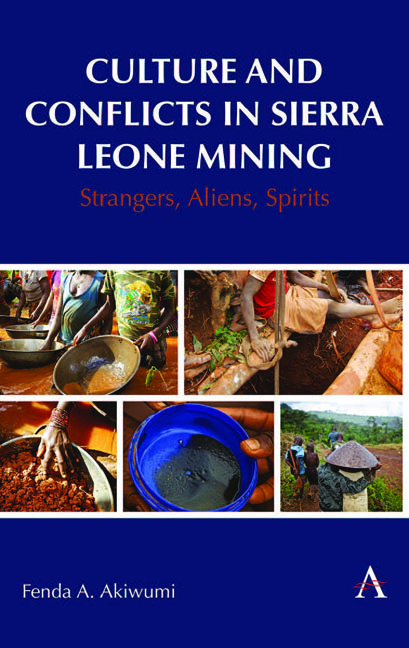Book contents
- Frontmatter
- Dediation
- Contents
- List of Figures and Tables
- Acknowledgements
- Abbreviations
- 1 Introduction: Culture in Commodity Chains
- 2 Sierra Leone’s Global Incorporation Through Mining
- 3 Cultural Difference: Policy and Legislative Dilemmas
- 4 Sacred Places: Local Ontology Meets Global Capital
- 5 Strangers, Environment, and Livelihoods
- 6 Race, Ethnicity, Class, and Gender in Mining
- 7 Between a Rock and a Hard Place
- 8 Conclusion
- References
- Index
1 - Introduction: Culture in Commodity Chains
Published online by Cambridge University Press: 13 April 2024
- Frontmatter
- Dediation
- Contents
- List of Figures and Tables
- Acknowledgements
- Abbreviations
- 1 Introduction: Culture in Commodity Chains
- 2 Sierra Leone’s Global Incorporation Through Mining
- 3 Cultural Difference: Policy and Legislative Dilemmas
- 4 Sacred Places: Local Ontology Meets Global Capital
- 5 Strangers, Environment, and Livelihoods
- 6 Race, Ethnicity, Class, and Gender in Mining
- 7 Between a Rock and a Hard Place
- 8 Conclusion
- References
- Index
Summary
In the whole history of economic activity the stranger makes his appearance everywhere as a trader, and the trader makes his as a stranger.[…] The stranger is by his very nature no owner of land.[…] Although in the sphere of intimate personal relations the stranger may be attractive and meaningful in many ways, so long as he is regarded as a stranger he is no “landowner” in the eyes of the others. (Georg Simmel in Levine 1971, 144)
In this book, l demonstrate that the low-level mining area conflicts of sub- Saharan African countries, such as Sierra Leone, and their influences on mineral policy, law, and development fundamentally stem from cultural conundrums. Cultural differences in the conceptualization of land rights, and land use and management between the state and the customary authority are inherent in mineral commodity chains causing conflicts. I emphasize that the customary landlord–stranger institution and its cultural underpinnings are central to an understanding of mining conflicts in Sierra Leone. I examine how the state addresses cultural differences in mining, and land governance, more generally. The book is a contribution to the world system research on culture in commodity chains, the literature on African mining conflicts, and the anthropology and social and environmental mining history of Sierra Leone.
Sierra Leone is located on the west coast of Africa with a land area of about 72,000 square kilometers, about the size of Ireland. The country is bordered by Guinea to the north and Liberia to the south. Politically it is divided into 5 provinces, 16 districts, and 190 chiefdoms (Figures 1.1–1.3). Under British colonial rule that ended in 1961, the area comprised The Colony (now Western Area) and the Protectorate. Sierra Leone became a Republic in 1971. The population is approximately 8.5 million made up of several ethnic groups (Temne, Mende, Limba, Kono, Korankoh, Fullah, Mandingo, Loko, Sherbro, Susu, Kissi, Krim, Vai, and Yalunka) and Krio (Creole) descendants of freed slaves resettled in Freetown in the late eighteenth to early nineteenth centuries. Women make up 51 percent of the population. Around 44 percent of the population lives in urban areas.
- Type
- Chapter
- Information
- Culture and Conflicts in Sierra Leone MiningStrangers, Aliens, Spirits, pp. 1 - 18Publisher: Anthem PressPrint publication year: 2024

